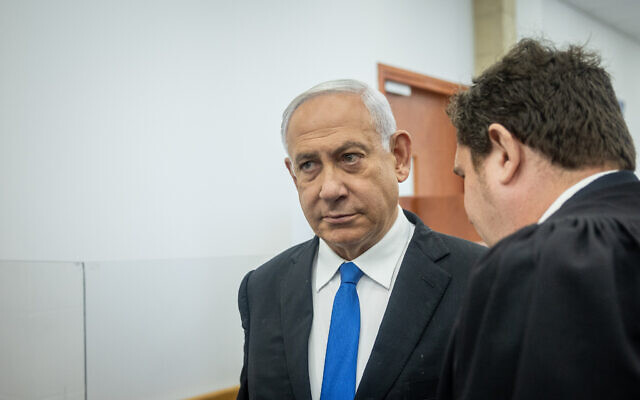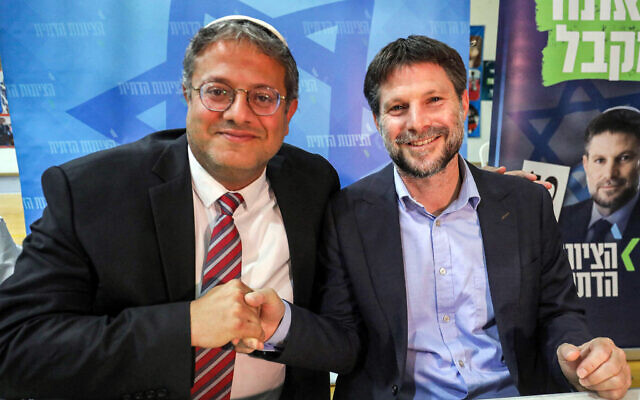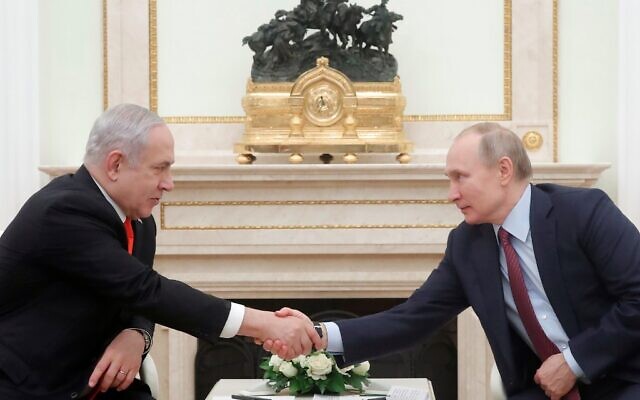Prime Minister Benjamin Netanyahu said he is ready to “hear counter offers” to the contentious plan spearheaded by his government’s justice minister to radically overhaul Israel’s independent judiciary but still defended the proposed legal shake-up on Tuesday to counter what he called “extreme judicial activism.”
The prime minister said Israel needed “a strong independent judiciary, but an independent judiciary doesn’t mean an unbridled judiciary,” in a wide-ranging interview with CNN that aired Tuesday for over an hour. The interview also covered Iran’s nuclear ambitions and Israel’s efforts to thwart them, the new governing coalition with far-right ministers, the Israeli-Palestinian conflict and prospects for peace, Russia’s ongoing war on Ukraine, the recent violence in Jerusalem and the West Bank.
A democracy needs “balance between three branches of government; in Israel, that balance has been thrown askew,” argued Netanyahu, who once again insisted that the proposed changes will make Israel’s democracy stronger.”
The Netanyahu coalition’s proposals, as presented by Justice Minister Yariv Levin, would severely restrict the High Court’s capacity to strike down laws and government decisions, with an “override clause” enabling the Knesset to re-legislate struck-down laws with a bare majority of 61; give the government complete control over the selection of judges; prevent the court from using a test of “reasonableness” to judge legislation and government decisions; and allow ministers to appoint their own legal advisers, instead of getting counsel from advisers operating under the aegis of the Justice Ministry.
These proposals have come under intense criticism across the board in Israel with leading financial and legal experts warning that the judicial overhaul plans will harm democracy and the Israeli economy. Mass protests have broken out and public petitions have been drafted by various officials, professionals, prominent economists, businesses, academics, the vaunted Israeli tech sector and others.
In his interview, Netanyahu argued that Levin’s proposals have existing “safety” provisions but critics “don’t want to hear” about it. Some of the critics’ concerns are driven by a lack of understanding, a lack of information,” but some criticism is just “sloganeering…frankly by political opponents who lost the election.”
The prime minister pointed to other parliamentary democracies like Canada and New Zealand where, he said, the courts have “no ability” to strike down laws passed by parliament.
Netantahy denied that the proposed judicial shake-up was driven by a desire to defang the judiciary in order to save himself from prison, potentially, amid ongoing corruption trials which he said were “unraveling.”
The prime minister is on trial in three corruption cases, facing charges of fraud, breach of trust and bribery. Netanyahu denies wrongdoing and claims the charges were fabricated in an attempted political coup led by the police, the state prosecution, the media, and leftist rivals.

File: Incoming Israeli prime minister Benjamin Netanyahu arrives for a court hearing in his trial, at the District Court in Jerusalem on May 31, 2022. (Yonatan Sindel/Flash90)
“None of the reforms that we’re talking about…have anything to do with my trial,” Netanyahu told CNN, arguing that the ongoing legal process was not an issue in the November elections, which handed his far-right, religious bloc 64 seats in Israel’s Knesset.
The premier said he “respectfully” disagrees with critics of the plans like Alan Dershowitz, who earlier this month said the overhaul would make defending Israel on the global stage harder, and held that the radical, sweeping changes, would bring Israel “in line with most of the democracies of the world.”
“Israel is right now in outlier, Israel has the most extreme judicial activism that’s gone off the rails and we’re trying to bring it back to where just about all the democracies are, both in the selection of judges and the balance between the various branches of government,” Netanyahu said.
“Correcting or restoring Israeli democracy will make the democracy stronger, [the] judiciary will remain independent, the rule of law will remain independent. Property rights, which I hold sacrosanct, [the] independent enforcement of contracts, it’s [all] going to be there,” he went on.
Turning to his coalition — the most far-right and religious in Israel’s history — Netanyahu quipped that Finance Minister Bezalel Smotrich of the Religious Zionism party and National Security Ministry Itamar Ben Gvir, of Otzma Yehudit, “got more seats than the previous prime minister,” in reference to former premier Naftali Bennett whose now-defunct New Right alliance nabbed just seven seats in the 2021 elections and went on to form a short-lived but broad coalition with Yair Lapid’s Yesh Atid, Arab party Ra’am, and others.

L-R: MKs Itamar Ben Gvir and Bezalel Smotrich at a rally of their Religious Zionism party in the southern city of Sderot on October 26, 2022. (Gil Cohen-Magen / AFP)
Reiterating previous remarks on his new far-right ministers, Netanyahu said, “they joined me, I didn’t join them and I direct policy and I think my records both on peace, on democracy, on the economy, on everything else has been very, very successful and Israeli people think it’s successful; that’s why they voted for me again and again.”
“I’m controlling the government and I’m responsible for its policies and the policies are sensible and responsible and continue to be that,” said Netanyahu.
Goals for a sixth term
The prime minister, who in late December began his sixth term in office, said he had “three overriding goals” for his tenure: “One is to thwart Iran’s nuclear ambitions; the second is to expand peace dramatically to end the Arab-Israeli conflict as a lead into ending the Israeli-Palestinian conflict, and the third is to further boost Israel’s incredible economy.”
Netanyahu, once again, vowed to do everything “in my power as Israel’s prime minister to prevent Iran from getting a nuclear arsenal that is expressly directed at annihilating us.”
“And they also say not only death to Israel but death to America,” he added.
Asked whether Israel was behind a drone attack on a defense facility in the Iranian city of Isfahan over the weekend, Netanyahu said he “never talks about specific operations” with some exceptions like the 2018 raid on Iran’s secret nuclear archive.

Prime Minister Benjamin Netanyahu departs after giving a speech on files obtained by Israel he says proves Iran lied about its nuclear program, at the Defense Ministry in Tel Aviv, on April 30, 2018. (AFP Photo/Jack Guez)
“Every time some explosion takes place in the Middle East, Israel is blamed or given responsibility…Sometimes we are [behind strikes], sometimes we’re not, but I will say that there is an overriding mission,” to thwart Iran’s nuclear ambitions.
“The only way that you can stop a rogue state from getting nuclear weapons is a combination of crippling economic sanctions” and “the most important thing is a credible military threat,” he went on. “And if this deterrence fails, you have no choice but to take action,” he warned.
Israel and the United States, Netanyahu said, have been moving “closer together” on the Iranian issue, some eight years after the two countries were at odds over the 2015 US-brokered nuclear agreement between Iran and the six world powers aimed at curbing Iran’s nuclear advancement in exchange for sanctions relief. Netanyahu famously clashed with then-president Barack Obama and his administration on this very issue, and loudly voiced his opposition to the nuclear accord, which US President Joe Biden has sought to rejoin after his predessesor, Donald Trump, pulled the US out of the deal in 2018.
“The world is moving closer to understanding what this Iran is: barbarism against their own people, the fact that they’re supplying drones that kill innocent people in the heart of Europe, in Ukraine,” he said in reference to Tehran’s provision of locally-made suicide drones to Russia for the Kremlin’s use in the nearly year-long invasion of Ukraine.
“People understand, they recognize how dangerous this regime would be with nuclear weapons and I think there are two aspects to preventing such an outcome; one is recognition and the other is action.”
On Ukraine, Netanyahu said he was “looking into” providing the country with “other kinds of aid” besides humanitarian help, amid concerns over a “complex relationship” with Russia and Israel’s “freedom of action” on its borders with Syria to “keep Iran in check.”

File: Russian President Vladimir Putin meets with then-Prime Minister Benjamin Netanyahu at the Kremlin in Moscow on January 30, 2020. (MAXIM SHEMETOV / POOL / AFP)
Israel has so far refused to provide military aid to Kyiv, out of apparent concern for Russia’s reaction. One major reason for Israel’s hesitance appears to be its strategic need to maintain freedom of operations in Syria, where Russian forces largely control the airspace.
“Just miles from here, on our northern border in Syria, Israeli aircraft and Russian aircraft are flying within spitting distance of each other,” he said, adding that Israel has no desire to enter into a Russian-Israeli military confrontation.”
“Iran is trying to plant itself in Syria right next to our northern border, the way they did in Lebanon with Hezbollah. I’ve adopted a policy over the last 7-8 years to militarily hit Iran’s military installation. They wanted to build an army here of 100,000 Shiite militia commanded by Iranian generals and we’ve systematically degraded them,” he explained.
“Israel needs to have freedom of action in the air… I was very open with [Russian President Vladimir] Putin about that. We can clash or we can make sure that we coordinate in such a way that our air forces do not clash.” he went on.
At the same time, Netanyahu said, Israel “acts in ways, that I will not itemize here, against Iran’s weapons productions which are used against Ukraine.”
Israel is not only trying to thwart Iran’s nuke program, but is “also taking action against certain weapons development that Iran has, and Iran invariably exports them.”
“Realistically, Israel in confronting Iran is also confronting the main partner of Russia” in its war on Ukraine, he said.
Some reports have said that the alleged Israeli strike targeted Iran’s suicide drone program.
Asked if he would consider mediating between Ukraine and Russia given Israel’s ties with both countries, the prime minister said he’d been asked before and would “do it now if I’m asked by both sides and frankly if I’m asked by the United States.”
“The peace of the world is at stake, as I think the peace of the world is at stake with Iran getting nuclear weapons, it will destabilize the entire world,” he said.


